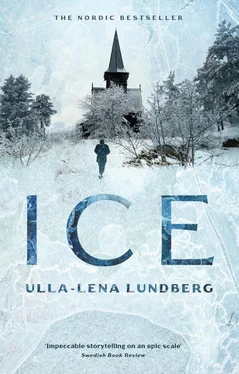Silence in the church. Mona rises, folds her veil back over her hat, takes Sanna by the hand, the wreath in the other, walks forward on steady legs, looks out over the congregation and speaks, while the whole church holds it breath. The child stands quietly by her side. She thanks them for the good years she and Petter had in Örland parish. She thanks Petter for the happy years granted her. She remembers his words to the grieving parents of the child they buried only one week ago. They were his words of farewell to her as well, though she did not understand it at the time. She lays the wreath on the coffin, adjusts it a little—good. Takes Sanna by the hand and returns to her pew. The church breathes out.
Then the parents and siblings, shaky and uncertain, broken voices, deep breathing. They are followed by other friends and relatives, and Uncle Isidor speaks for the entire family. “Petter Kummel followed his calling without expectation of success,” he begins, in an old man’s quavering voice, then takes heart and continues. “But success came. Those who heard him were open to his simple but profound message. Almost unnoticeably, all eyes turned to him. His naturally unassuming character and his honesty in both word and deed drew people to him. He struggled with his own sins as much as he did with those of his fellow men. On his travels, he faced storms and heavy seas without fear, but he trembled like a child before the sin and the temptations that carry many a priest to his spiritual grave. Yet that struggle ended in victory. During his years as a spiritual guide, the young priest grew more and more intimate with the power that flows from the gospel of the crucified Christ.
“My dear nephew, whom we miss so much,” he went on, a little less firmly, with many pauses. “You have accepted the call to service in a new temple and need no longer tremble in the face of strong waves of temptation. The sea and its perils will not confront you there.” He is unable to continue and gropes his way back to his seat.
Adele Bergman, deep in grief, hears the organist walk past her down the middle aisle. He is to speak on behalf of the parish and the vestry, but how will he manage, emotional as he is, and devastated by this death?
The vestry’s large wreath in front of him, unembarrassed by his tears, his speech in his breast pocket. Amazingly collected. “Dear Petter, our good friend and spiritual guide. Last Sunday when you laid to rest a little songbird from the east villages, you carried us metaphorically into God’s heaven on a bridge of light. When you headed home that evening, little did you dream that you yourself were stepping onto the bridge of light you had described. You have left us and entered God’s heaven. Your importance for the spiritual life of this community extends far beyond the few invaluable years we had you here. Now as we look forward, we pray, dear heavenly Father, give us again a shepherd who understands us.”
His wreath placed, the local council next. Sörling and Fridolf, sombre, bow towards the coffin and the family. Berg and Skog come forward with the wreath from his clerical colleagues, Adele Bergman, weak with tears, lays the wreath from the Health Care Centre. Sörling reads the council’s memorial and a special message from Doctor Gyllen. Then he reads a mass of condolences and memorials from a great many people who’ve been touched in some way by Petter’s life and death, foremost among them the bishop and the assessor.
In conclusion, with fearless courage and one hand on the keyboard, the organist sings “A Precious Thing to Thank the Lord”, all the way, across a bridge of light, safely ashore.
And then, no turning back. The church goes silent. No voices, only the rustle of people who have been crowded together too long and need to stretch. A pause, and the pallbearers step forward, raise the straps to their shoulders. Now. Berg and Skog start walking, the coffin follows, then the immediate family from their pews and then the congregation, row by row.
Digging the grave was no easy task, they can be grateful that the ground wasn’t frozen all the way down. It turns its dark maw towards the procession with its defenceless casket. For the Örlanders, the climax of the funeral is the moment when the coffin is surrendered to the earth. There is then no longer any need for self-control, they weep, they cry out, they kneel and stagger, grief, at this moment, need know no bounds.
All through the long funeral service they have stared at Mona Kummel’s veiled head and shoulders. No trembling, no bowing of the head, no leaning to the right or the left to get support from mother or mother-in-law. She sits with Sanna beside her as if they were alone in the world, condemned to endure and survive. Ever since the death, the widow’s unnatural self-control has been a source of collective concern on the Örlands. Everyone knows that open mourning is a good thing, everyone hopes that something will call forth the sobbing that wholesome grief requires.
Now all of them move towards the grave. Pushing and crowding are permissible at such times. No one thinks about priorities and status. When the coffin is lowered, which those standing farther away cannot even see, a wail goes up like a flame. The crowd surges, cries are heard above the weeping, people grab hold of one another, women call out, “No! No!” Those standing close to Mona try to save her, they sob loudly and try to draw her along, but even in the tightly packed crowd at the grave, she manages to parry their efforts and withdraw. Stiff and cold, she stands there and refuses to cooperate on their terms, strives only for distance.
Higher up in the churchyard, where she can see, is Cecilia. Why can’t they leave the pastor’s wife in peace? Don’t they understand that she’s not like them? Why can’t they respect the fact that she needs air between herself and the world? The one she feels sorriest for is Sanna, who is small and short and can’t see a thing among all these large, black people crowded around her. She is scared to death and is crying out loud with open mouth. Cecilia can see Mona saying, “Quiet, Sanna!” She moves towards them, but then Grandmother Hellén works her way through the crowd and takes Sanna’s hand. No one hears, but what she says is, “Don’t be afraid. This will be over soon and then we’ll go home.”
But it doesn’t go that quickly, because on the Örlands the custom is to fill in the grave while the widow stands at its edge and watches the coffin disappear beneath the soil of the churchyard. So thin it is, she thinks again. A miracle that anything can grow in it. Almost laughs out loud—a miracle, yes indeed. Sanna cries loudly, pushed dangerously close to the hole. Soon they’ll throw her in and shovel dirt on her until she dies!
Maybe I shouldn’t have brought Sanna with me, Mona thinks, distractedly. She floats a little, loses contact with the ground a bit, hears nothing even though they’re all making so much noise. The veil is good. She’d like to wear it always. No one can see you, it doesn’t matter that you’re not here. She feels nothing, everything slips and slides away, and just then her mother takes her under one arm, Sanna is still screaming, and her mother gives her a little shake. “Mona! They’re starting to go! What an ordeal! Poor Sanna!”
Through her veil she sees that several of the women curtsey to her before they turn to go. The men bow reluctantly, the way they do at the Communion table. She nods back, as is proper. “Goodbye. Thank you.” Quite clearly. Petter’s family stands by the grave, their arms around each other. Skog is with them, Berg by himself, near Mona and Sanna and Mrs Hellén. Sorrow or just fear? What is it he’s supposed to say? What should he do? Adele Bergman knows. She works her way to Mona. “Dear heart! God give you strength! We are all crushed. Such grief.”
Читать дальше












